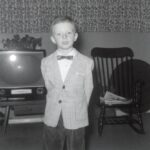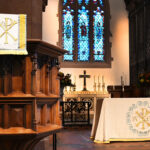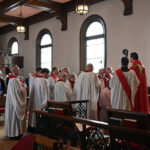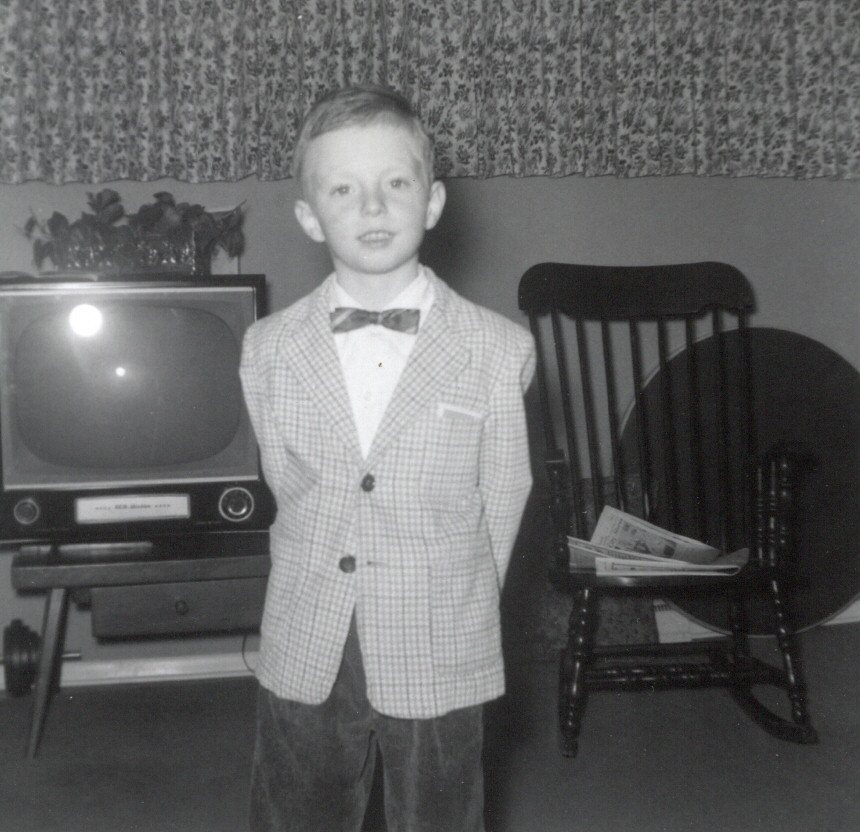
My Journey in the Episcopal Church
as a
Gay Person
by Joseph Davison
I was surprised and honored when I was asked to write a reflection of what it was like to grow up as a gay person in the Episcopal Church in Delaware.
My family were members of what was then St. Andrew’s Episcopal Church in Wilmington, and church was intimately intertwined with the rhythms of my family’s life. Besides my immediate family, my grandmother, two aunts, an uncle, and a cousin were members as well. Our family history there began around the beginning of the 20th century. My father and his sisters were baptized there as were my brother, my cousin, and I. The ties that bound us to The Episcopal Church were multi-generational.
During my childhood, there were lots of adults plus many children my age in church. It was also very formal and at times a little scary. As a little child, when I heard the organ for the first time, I laid on the pew and covered my ears. I attended Sunday school, sang in the junior choir, and served as an acolyte. We attended faithfully. In fact, Sunday morning simply didn’t seem right if we weren’t in church. Being gay at this point didn’t seem to have much of an impact. It began to come into play in the 1960s as I came to awareness. I remember reading a feature article in Time magazine in the mid-1960s on homosexuality and it struck me like a thunderbolt. I thought: “That’s what I am.” The description, feelings, and orientation matched me perfectly. Immediately following that thought came another thought: “No one must ever know.” In that instant, I knew I was a member of a despised minority that was surrounded by a pall of silence. I was now dealing with fear of losing things that I valued dearly. I felt isolated and alone. I knew no one like me, and I had no one to turn to.
So, I was on my own. I was fearful of discovery. I tried to monitor my behavior so that I didn’t give myself away. In a haphazard way, I tried to process my situation. I pondered, I read, I prayed. I hoped and tried to change. When that proved unsuccessful, I tried to act in a straight fashion (and from what people tell me that wasn’t particularly successful either!). I tried to suppress and even repress the core of who I am. I was overwhelmed. My processing was like taking a book from a shelf and reading a little bit at a time, then putting the book back on the shelf. I could only handle my gayness in small doses.
During my university years I participated in Intervarsity Christian Fellowship and my overall theological outlook leaned in the literalist direction. While this didn’t help my processing, it did greatly expand my knowledge of scripture that became a critical piece of my journey.
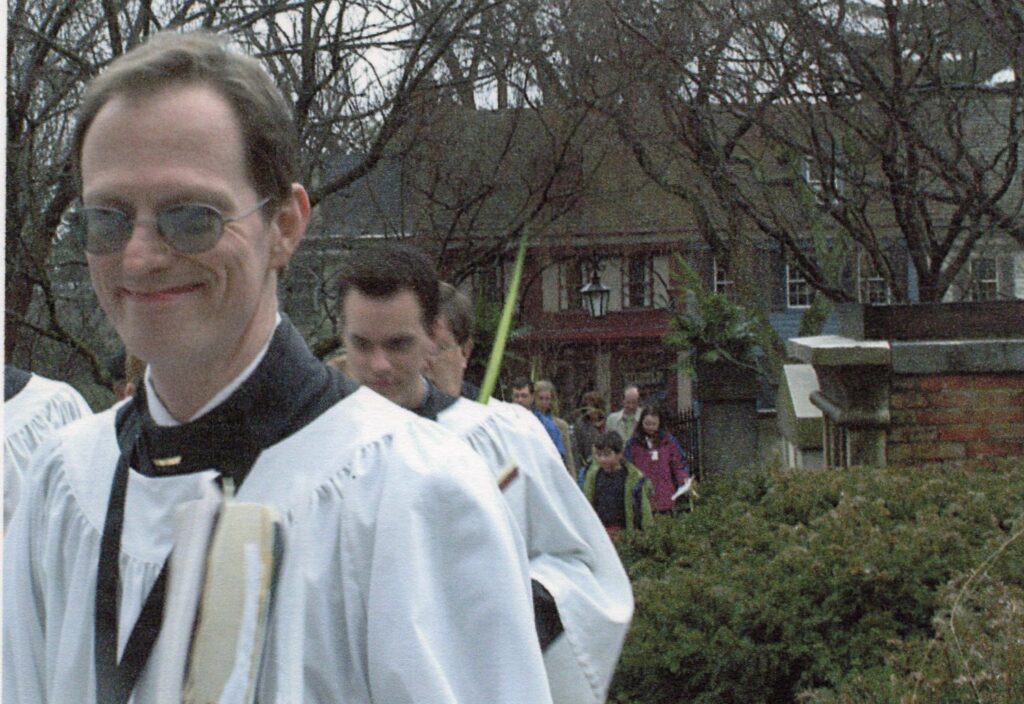
My participation in the life of the church not only continued but increased. After college, I continued attending St. Andrew’s where I joined the adult choir, and I served on vestry and other committees. I became a chalice bearer and a eucharistic minister. As time went on, I found a literalist construct harder and harder to swallow. By the time I began Education for Ministry, a theological vacuum had formed. The readings and information provided in the program helped to fill that void. Also, during this timeframe several individuals in church came out to me which helped immensely. I came to realize that I was not alone, and that there was nothing wrong with our gay orientation. My life experience and my theological reflection were teaching me that being gay was how I was made and a part of who I was. I became more confident in myself.
Despite all this there was the ongoing concern that I would be discovered and expelled from church. I wasn’t sure how my family would respond, and I certainly didn’t know how the congregation would respond. It was a difficult time in many ways. Despite my worries about human reactions and my own struggles with my orientation, I always believed that God truly accepted me without reservation.
I continued to take my own sweet time processing it all. By the time I came out I was good and ready. I came out to my parents, to family, and then to church, beginning with my Education for Ministry group. My mother was my ultimate champion. If she thought that anyone was heading towards possibly making an anti-gay statement, she would pre-empt them by simply saying, “Before you go any further, I think you need to know I have a gay son.” The congregation, many of whom had known me practically from birth, was accepting. I wondered, was the gay me so different from the image of a straight male that I tried to project? Ultimately my fears of rejection and expulsion were unfounded. Unlike many gay persons I received inclusion and acceptance from my church family.
Later, I was introduced by mutual friends and fellow Episcopalians to my husband to be, Phillip Stephens. He was in Colorado at the time — I was here in Delaware. As we grew closer, fell in love, and became more committed, he moved East to be with me in Delaware. Shortly thereafter we started to attend Immanuel on the Green in New Castle, a church that we selected jointly. We also asked for our union to be blessed by the Church. This turned out to be a lengthy process involving meetings of a small diocesan committee to draft the language of the liturgy, and there were parish meetings as well. The parish meetings were very public but a very necessary part of the process. As the time for the blessing approached, the rector sent a letter to all households in the parish. There was no hiding at this point. A small group of parishioners did object, but some of those withdrew their objections when they found out who the individuals involved were. In all, the process took seven years. Ultimately on September 29, 2001, our relationship was blessed at Immanuel Church with about 140 people in attendance. Given the distinct possibility of protesters we were advised to employ a plain clothes policeman to monitor the event.
We have fully participated over the years in the life of our various parishes — attending regular worship (sometimes more than once a week), as secretary to the vestry, choir master of the junior choir, Eucharistic visitor, chalice bearer, members of the choir, treasurer, junior warden, chair of the finance committee, etc. We have seen seven God children baptized, confirmed, or received into the Episcopal Church.
We are now legally married in the eyes of the state, but the priority was always to be right in the sight of God. In September 2001 our vows were taken in the presence of God to God and to each other.
Being an Episcopalian is at the foundation of who I am, with my life revolving around the church — Sunday worship, choir rehearsals, committee meetings, fellowship, etc. I believed then, and still believe, that I was placed in the Episcopal Church for a reason. If I hadn’t been baptized into it, I would have needed to have found it. It has been an integral part of a lifelong journey.
Listen to 30-second compelling video from Joseph Davison.
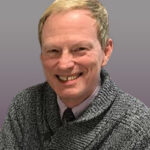
Joseph Davison is a member of Immanuel Church, New Castle. He worked for the State of Delaware for nearly forty-years as a social worker and in various managerial and administrative capacities. A life-long member of this diocese, he has served in the following roles split between two parishes: vestryperson, clerk of the vestry, treasurer, assistant treasurer, junior warden, lay eucharistic minister, lay eucharistic visitor, and chorister. He has worked on diocesan conventions from 2015 until 2023.
